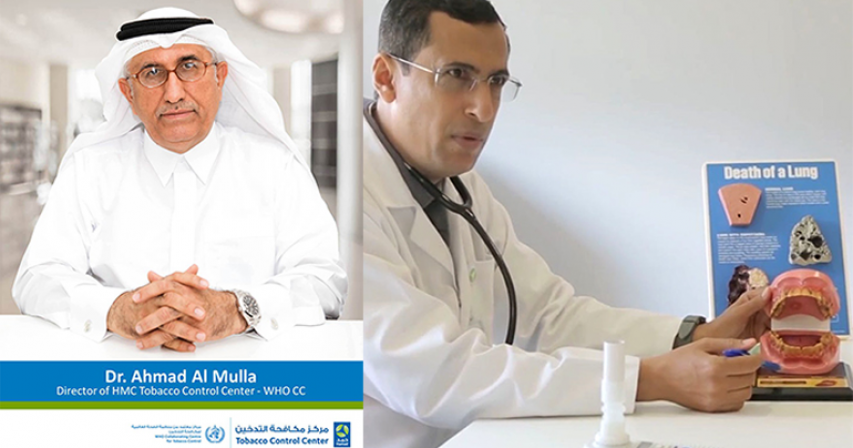The Holy Month of Ramadan Provides an Opportune Time to Quit Smoking, Says HMC Smoking Caseation Expert
- 4 years ago

Dr. Ahmad Al Mulla, Head of the Hamad Medical Corporation’s (HMC) Tobacco Control Center, says Ramadan is an opportune time to quit smoking. According to Dr. Al Mulla, fasting has a lot of positive effects on one’s health, and those benefits are especially prominent in tobacco users who give up smoking.
“For smokers, quitting is often easier during Ramadan as those who fast are already required to abstain from food and drink, as well as from smoking cigarettes and using other tobacco products, from dawn to sunset,” said Dr. Al Mulla.
“The positive health effects of quitting smoking begin quickly after your last cigarette. Your blood pressure and pulse will start to return to more normal levels and nicotine levels in the body start to decline gradually. The body also begins to cleanse itself of the toxic substances and blood viscosity returns to normal levels. Smokers who quit this habit also start to feel improvement in their sense of smell and taste and their immune system’s ability to fight off diseases improves over time.”
“During Ramadan the number of smokers who visit us with an intention to quit is higher than during other periods of the year because fasting, and the holy month in general, is an ideal time for smokers to be more thoughtful about their health and the impact lifestyle choices have on their wellbeing,” added Dr. Al Mulla.
Dr. Al Mulla said the Smoking Cessation Clinic provides patients with the tools and support needed to replace their nicotine consumption habit and to cope with withdrawal symptoms. He says nicotine, which is one of the substances in tobacco products, is highly addictive.
“Cigarette smoke contains more than 45 poisonous chemicals that are known as causes of cancer. Carbon monoxide is just one of many hazardous chemicals in cigarette smoke and this colorless, odorless gas replaces oxygen in the blood and can cause shortness of breath and dizziness. Additionally, tar inhaled during smoking can cause lung cancer, heart disease, stroke, and respiratory disease. Smoking is a major threat to the health of a smoker and to the people around them who are exposed to second-hand smoke,” said Dr. Al Mulla.
“Exercising, drinking plenty of water during non-fasting hours, and spending time socializing with friends and family members who do not smoke can help decrease the urge to smoke,” said Dr. Al Mulla.
Dr. Jamal Abdullah, Smoking Cessation Specialist at HMC’s Tobacco Control Center, said Ramadan can make it easier for people to quit smoking. He explained that the sudden drop in nicotine levels in the blood during fasting can result in withdrawal symptoms such as strong cravings, poor concentration, nerviness, and headaches. These symptoms are normally most pronounced during the first week of quitting, but they gradually become less intense and disappear over time. Ramadan can help many smokers quit this habit by following a method known scientifically as the 'cold turkey' method, which is based on stopping smoking abruptly. However, some smokers might need professional support and nicotine replacement therapy to help them quit this habit.
“For many smokers, quitting is easier during Ramadan. We encourage smokers to quit this habit as soon as possible and before they develop serious chronic diseases as a result of smoking. Unfortunately, these diseases can be lifelong and can affect the health of the smoker for the rest of his life even if he quits smoking at a later age. We see every day in our clinics smokers in their thirties and forties who have developed heart diseases and had to be treated with cardiac stents as a result of smoking,” said Dr. Abdullah.
HMC’s Smoking Cessation Center urges smokers to benefit from the services provided by the center to help themselves quit smoking. People can contact the center by calling 40254981 or 50800959.
Comments